In this article:
Hair growth is a common worry for many people striving to achieve healthy locks. While genetics plays a vital role in hair growth, factors such as lifestyle, diet, and hair care products also contribute to hair’s overall health.
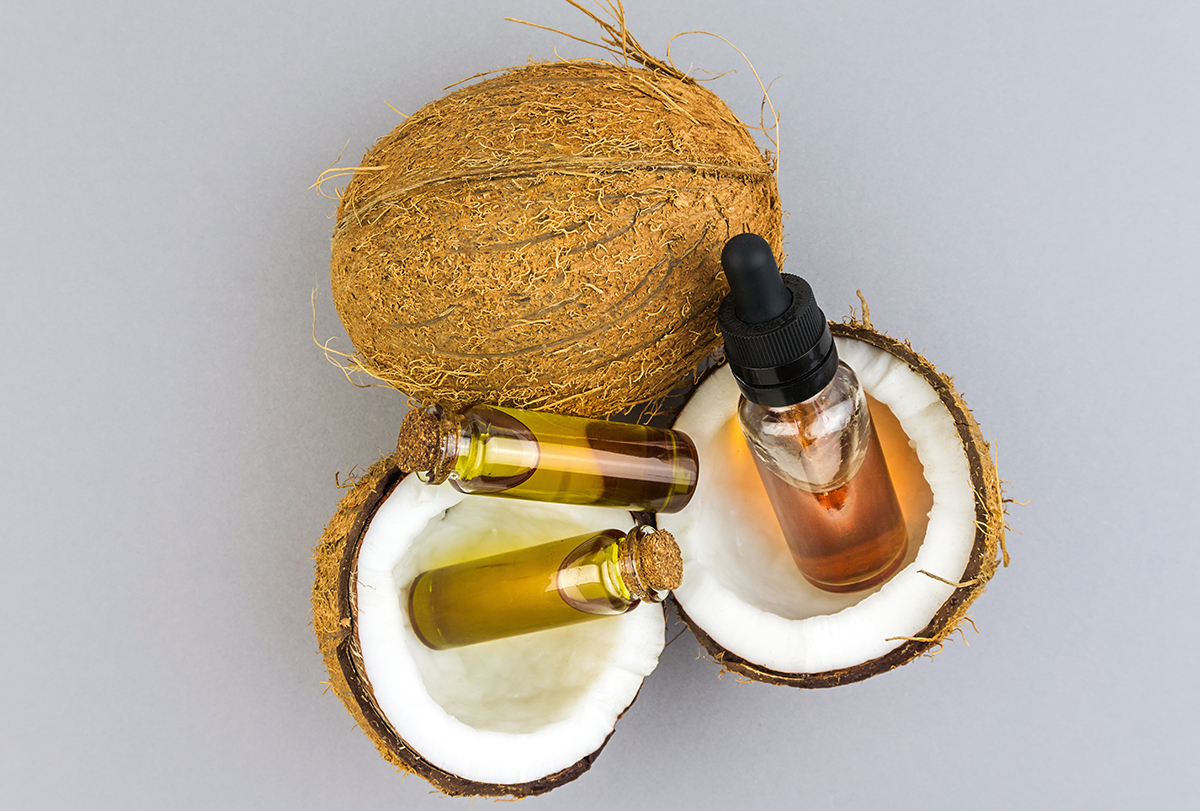
In recent times, natural oils such as coconut oil and mustard oil have earned fame as potential solutions for stimulating hair growth. Both oils have unique properties that can help with hair growth, and deciding which one is better depends upon various factors. (1)(2)
Coconut oil, known for its light consistency, can help prevent protein loss, ultimately strengthening your hair. It is often preferred for regular use, especially for those with normal hair, but it also works for damaged hair. (3)
On the other hand, mustard oil is a good choice for deep conditioning hair masks, particularly for damaged hair. It can be used occasionally to help repair the hair. (2)
Some experts also advocate using a combination of both oils for additional benefits or incorporating both in the hair care regimen, with coconut as a daily use oil and mustard oil as a once-a-week mask.
This article will compare coconut oil and mustard oil and their effects on hair growth. Read on to find out.
Coconut Oil or Mustard Oil: Which Is Better for Hair Growth?
Coconut oil and mustard oil both have unique properties that can improve hair growth. The best choice for you may depend on the following factors.
Nutritional content
Coconut oil is a rich source of medium-chain fatty acids such as lauric acid, (4) while mustard oil is a rich source of omega-3 fatty acids. (5) Both types of fatty acids are necessary for hair growth. (6)(7)
So, only in terms of nutritional profile, experts claim that both oils are wonderful for supporting hair growth and managing issues such as alopecia. (8)
Hair type
Coconut oil is lightweight (2) and readily absorbed by the hair, making it suitable for fine or thin hair that requires moisture without weighing it down. Mustard oil, with its thicker texture, may function reasonably for dry or coarse hair types, delivering deep nourishment.
Also, if you think your hair is brittle and that is why you’re experiencing hair growth problems, coconut oil can be your savior as research has shown that coconut oil works well in treating brittle hair. (9)
Dandruff problems
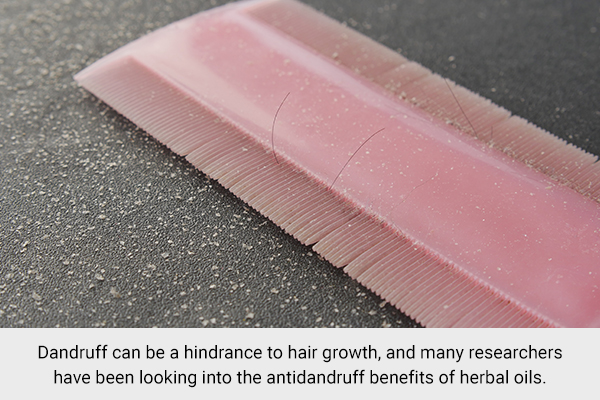
Dandruff can be a hindrance to hair growth, and many researchers have been looking into the antidandruff of herbal oils.
Coconut oil has been found to have effective antidandruff properties, with a study showing a high success rate of 90% in preventing dandruff in south Indian patients when applied to the scalp. (10)(11)
However, mustard oil may not be as effective in combating dandruff as it was unable to show any activity against dandruff. (12)
These results show that coconut oil is a better candidate for combating dandruff, making it a suitable option over mustard oil for hair growth if dandruff is a concern.
Scalp sensitivity or scalp issues
If you have scalp issues, coconut oil might be better for you than mustard oil. Research has shown that coconut oil works well in maintaining a healthy scalp and addressing scalp issues.
Coconut oil has been found to promote a balance of healthy bacteria on the scalp, which can contribute to a healthier scalp environment. It may also help inhibit the growth of harmful fungi that can lead to scalp problems. (10)
Mustard oil, on the other hand, may not be suitable for individuals with sensitive scalps or scalp issues as research has shown mustard oil can cause skin conditions that result in rashes on the skin. (13)
Penetration into the hair shaft
According to dermatologists, coconut oil, being lightweight, can penetrate the hair shaft better than mustard oil and nourish the hair. This increased penetration of coconut oil may allow for greater nourishment of the hair and scalp, promoting healthier hair growth. (2)(3)
Fungal infections
Fungal infections can hinder hair growth. While both coconut and mustard oil have antifungal activity, coconut oil fights fungal infections of hair and scalp better than mustard oil.
According to a study, coconut oil showed higher toxicity against fungi when compared to mustard oil for various species of infection-causing fungi (dermatophytes) such as T. mentagrophytes in the hair. (2)
Hair damage from grooming practices
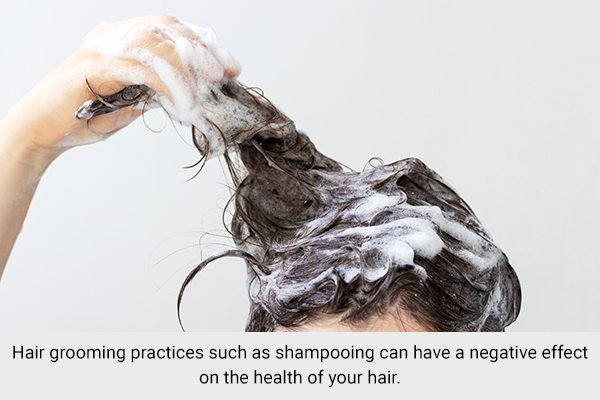
Hair grooming practices such as shampooing can have a negative effect on the health of your hair. For instance, shampooing can pull out the natural oils on the hair surface. This repetitious cycle of shampooing may potentially result in hair damage.
In a study, it was observed that coconut oil is predominantly used by Indian students to protect their hair from this damage. Coconut oil’s desirable effect is attributed to its outstanding proficiency to penetrate the hair cuticle, providing a shield against grooming damage. (14)
So, if you experience hair loss due to the use of hair care products such as shampoos, use coconut oil before shampooing to prevent such a problem.
Possible side effects
Coconut oil is a safe and commonly used oil for skin and hair care. (15) However, using too much of it can cause a buildup of oil on the scalp and hair. This may result in dull, greasy hair.
While the use of mustard oil is safe on the hair, it may cause skin irritation when applied topically. This is because it contains allyl isothiocyanates, which can be irritating to the skin. (16)
Benefits of Coconut Oil on the Hair
Coconut oil has been used for centuries in many parts of the world, including South India, Sri Lanka, Indonesia, Malaysia, Australia, and South America.
It is obtained from the fruits of Cocus nucifera and is widely popular due to its many beneficial properties for the hair. (2)
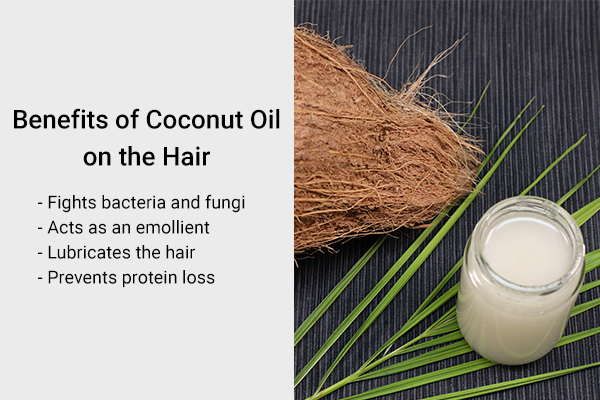
1. Chemical composition
Coconut oil is composed mainly of saturated fatty acids and is one of the richest sources of medium-chain fatty acids. The major fatty acids present in coconut oil are myristic acid, capric acid, lauric acid, and monolaurin.
Additionally, it contains phenolic acids and antioxidants such as tocopherol. (2)
2. Effects on hair
Coconut oil has many benefits when it comes to hair growth. Some of these include:
- Fights bacteria and fungi – Monolaurin, a component of coconut oil, has been shown to be an effective antifungal and antibacterial agent. Thus, it can protect your hair from bacterial and fungal infections. (17)(2)
- Acts as an emollient – Coconut oil can form a coating over the hair shaft, which helps to seal the cuticle and trap moisture inside. This ensures your hair remains smooth and easy to manage. (2)
- Lubricates the hair – Coconut oil helps to easily slip your hands between the hair strands, making it easier to detangle the hair. It also smoothens and flattens the cuticle surface, which improves the health and appearance of the strands. (2)
- Prevents protein loss – Due to its low molecular weight and straight linear chain, coconut oil can penetrate the hair shaft, helping to prevent the loss of protein from the hair. (3)
Benefits of Mustard Oil on the Hair
Mustard oil is derived from the seeds of the Brassica nigra plant and is commonly cultivated in India, China, Canada, and England. It is also a well-known oil for hair care. (2)
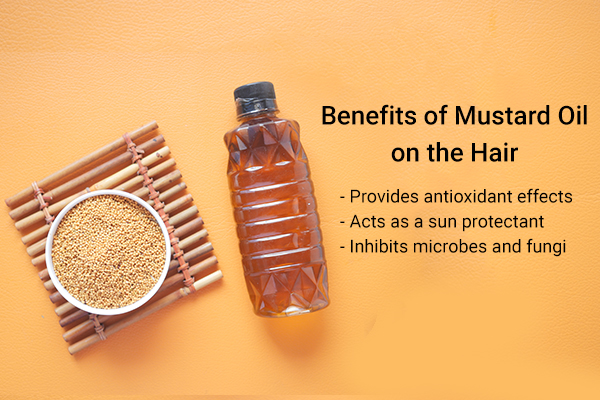
1. Chemical composition
Mustard oil is composed of several fatty acids, including linoleic acid, linolenic acid, oleic acid, and myristic acid. It also contains other useful compounds such as carotenoids and sinigrin. (2)
2. Effects on hair
Mustard oil has many benefits when it comes to hair. Some of these include:
- Provides antioxidant effects – Mustard oil contains amino acids such as cysteine, which act as antioxidants that protect the hair from free radicals that can damage it. (2)(18)(19)
- Acts as a sun protectant – Due to its thick consistency and high vitamin E content, topical application of mustard oil can protect the hair against the harsh UV rays. (2)
- Inhibits microbes and fungi – Mustard oil has broad-spectrum antimicrobial activity and has been shown to be effective against a wide range of infection-causing microbes. Mustard oil also inhibits the penetration of fungi in the hair, although it is less effective than coconut oil. (17)(2)
How to Use Coconut and Mustard Oil on the Hair
Here are some simple steps for using coconut and mustard oil on your hair.
Using either mustard oil or coconut oil
- Warm up the oil in a bowl by placing it in hot water for a few minutes.
- Part your hair and apply the oil to your scalp, working your way through each section of your hair.
- Massage the oil into your scalp for 5–10 minutes.
- Leave the oil on for at least 30 minutes or overnight for maximum benefits.
- Rinse it off with shampoo and water.
Using mustard oil and coconut oil together
- Mix equal quantities of mustard oil and coconut oil.
- Apply the mixture to your hair, from the roots all the way to the ends.
- Gently massage the oil into your scalp.
- Leave the oil mixture on your hair for about 30 minutes.
- Rinse your hair thoroughly and shampoo.
Precautions When Using Hair Oils
To prevent any potential irritation, it is recommended to conduct a patch test by applying a small amount of the oil on your skin to check for any negative reactions before using it on your hair or scalp.
It is also crucial to select high-quality hair oil from a trustworthy source. Inferior-quality oils may be less efficient or may even contain harmful substances.
Most-Asked Questions
Can coconut oil or mustard oil make hair grow faster?
While coconut oil and mustard oil can improve hair growth, they cannot make hair grow faster than its natural rate.
Can coconut oil or mustard oil cause hair loss?
Coconut oil and mustard oil are safe for use on the hair and do not cause hair loss.
How often should I use coconut oil or mustard oil on my hair?
It is recommended to use coconut oil or mustard oil on the hair once or twice a week.
Can I use coconut oil or mustard oil for hair growth if I have a sensitive scalp?
It is recommended to do a patch test before applying the oils to the entire scalp.
Final Word
Coconut oil and mustard oil are natural oils that can promote hair growth and improve hair health. Both oils contain unique properties that can nourish the hair follicles and strengthen the hair.
Using natural oils such as coconut oil and mustard oil can improve hair growth, but it is also important to maintain a healthy lifestyle and diet for optimal hair health.
- Was this article helpful?
- YES, THANKS!NOT REALLY


